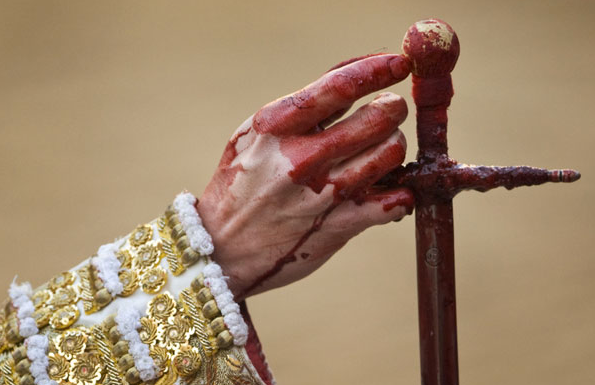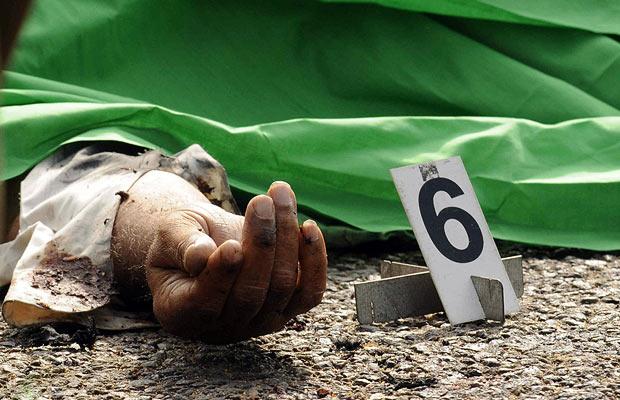I thought it was the hand of a priest:
Protestant upbringing + Lent + gold embroidery + blood + cross = mistaken perception based on murky tales of medieval cultic practices involving lurid displays of mortification. From there it’s a quick step to announcing that, once again, the church has blood on its hands.
In fact, the cross is not even a cross. And the priest is a matador. The matador’s hand is holding one of his swords, one obviously still sticky with the bull’s thick blood.
But one could say that this is not a sword. For anyone familiar with Christian iconography, the sword could very well double as a cross, and as only a cross, and particularly when smeared with blood. If the imagery seems medieval, that might say only that the medieval artists behind the allusion got it right. If so, the spectator should also be seeing the blood of Christ; if applied to the bullfight, the point would be to believe that God cares not for the supposed triumph in the ring but for the poor animal as it suffers and dies.
Those in the arena will have seen something else as they appreciated the choreography of that ritual violence. The photo captures some of that drama, beginning with the blood bonding of the ornately clad matador, embodiment of art and civilization, with the animal nature of the bull. The antique weapon, gilded clothing, and refined use of the hand together create a charmed circle of performance within which the blood can flow, again and again and again.
That is not the only example of ritualized violence, however.
It could be the hand of a penitent, or of a priest preparing to administer the Host, or of a beggar, or someone about to give a blessing. It is not a hand, however, but a dead hand. There is no blood, but someone was slaughtered in public much like any bull in a ring. There are no vestiges of the middle ages, as this is a thoroughly modern scene with plastic tarp and aluminum hardware. But it is ritualized for all that. Another terrorist bombing in Sri Lanka, an act of violence so common that they have developed little metal fixtures for managing the forensic investigation.
And not without symbolism. That number six refers to a segment of the crime scene marked for photographic identification, yet it signifies more as well: there were others, there will be others, we’re each just a number, take a number and wait and your number will come up soon. There is no blood, but this bureaucratic item is equally horrific. We are supposed to believe that although the killing continues, everything is under control. Everything is not under control. And in a world of ritualized violence, accidental symbolism may be one way to get back to the suffering.
Photographs by Daniel Ochoa de Olza/Associated Press and AFP/Getty Images.


FANTASTIC!
I bookmarked this link. Thank you for good job!
i will to join the cult
this beggerno. but this LTTE violence Bomb killed people. This wrong picture caption